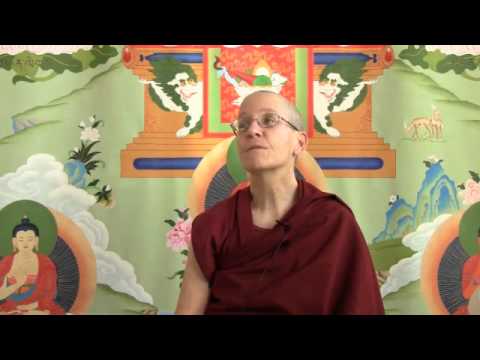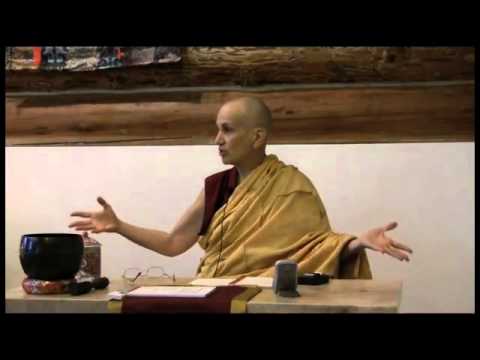Power of regret: Understanding karma
Part of a series of teachings given at the Winter Retreat from December 2011 to March 2012 at Sravasti Abbey.
- The importance of regret in purification practice
- The meaning of regret
- How regret depends on understanding karma
Vajrasattva 14: The power of regret, part 1 (download)
We’re going to continue with the Vajrasattva sadhana moving onto the power of regret. The first paragraph of that in our text says:
Spend some time reviewing harmful physical, verbal, and mental actions you have done, both those you can remember and those you created in previous lives but cannot recall. Generate deep regret for having done these, have a strong wish to be free from their suffering results and to avoid causing harm to others and yourself in the future.
We’ve touched on regret. Actually we have spent quite a bit of time on regret and we are going to spend a lot more. This whole week is going to be looking at regret in terms of that power in its relationship to our purification practice. We keep saying it is the most important. Pabongka Rinpoche gives us the reason. If we have this regret, if we get regret right (if you will), everything else follows all by itself. This is because everything hinges on the depth and our understanding of our regret. This very first half a line:
Spend some time reviewing harmful physical, verbal, and mental actions you have done.
I suspect people have been doing that a lot. Generally, I think we have two extreme reactions to that verse of spending time reviewing harmful physical, verbal, and mental actions we have done. One is you start looking and you go, “Oh, my god.” You look a little more and you go, “Oh, my god.” You look a little more and you go, “Oh, my god. I am so terrible la-la-la-la-la-la- la.” Then you dive into a deep depression. It could take the rest of retreat to get out of it. That is one very common response.
Another one is to look at is, “Okay, I did that, I did that, I did that and that and that. Okay, purify those five things. Now purify them again, now purify them again, now purify them again, and I am out of things to purify.” This is also very common. Both of these are symptomatic of actually not really understanding regret correctly.
I think this must be very common. I say this because in his commentary on this Pabongka Rinpoche, who is a twentieth century lama, on the Lam Rim Chen Mo, says, “It is not helpful to be either indifferent to one’s misdeeds or to be afraid of them.” Not helpful either to be indifferent or to be afraid—and that is generally where we go. He says we must as beginners expiate them and do it vigorously for a long time. Then if we are not to be afraid of them or not to be indifferent of them, what is the fuel for expiating vigorously? It is the result of having faith or conviction in cause and effect. So we have to spend some time understanding karma—cause and effect.
All of the teachings, including Je Rinpoche’s [Lama Tsongkapa], talk about how essential it is that our regret comes from an understanding of the results of the action that we are purifying. If we think about the result of our action, then we should be able to get a little energy behind our regret. Not as a feeling of guilt, not as a feeling of shame, but bringing a wisdom mind that says, “Oh, the wisdom that understands conventional reality that things arise, results arise, from causes. I created a cause that is going to have an effect that will be suffering for me and possibly for other people as well. I don’t want to experience that effect.”
How do we bring a wisdom mind into our practice of regret? How do we do that? We can spend a lot of time, we can spend a whole session, just on this first line. This is because the power of regret takes a spotlight and really delves into, “What is this negative action?” You can look at it through a really clear bright light analyzing from two different directions. One is that we look at the future. Study up on what you know about the effects of karma. If you don’t know much about it, I really recommend you go to the lamrim, or any lamrim book. Really look at what the teachings tell us about how our actions manifest; how the results of our actions manifest.
Nagarjuna’s Precious Garland has a beautiful six verse list, from verse fourteen to verse twenty, where he just enumerates very briefly.
From killing comes short life, from stealing comes lack of resources.
It’s a short from; it’s the cliff notes. But it gives you an idea of: from killing comes a short life, and that comes after I have a lower rebirth. Killing causes a lower rebirth, once I have a human rebirth again, then, the effect is to have a short life myself. There are a whole lot of other subtle possibilities. All these results occur unless we purify!
We can think about what are the future results of an action. We look at the specific action. Knowing what I know about cause and effect, what is a specific result I might experience as the result of this? Truly meditate on that. Depending on where you are in relationship with thinking about rebirths in different realms, and if you are comfortable with that, really think about what does it feel like to have a rebirth in a body as a hell being. What does it feel like to have a rebirth as an animal who must kill in order to live? This puts some fuel into our practice.
Then you can go back and analyze it from the other direction. For example, what was in my mind when I was doing this action? Where did it come from? What was the motivation? What was the affliction that arose in my mind? How did this come about? We can generate compassion for what arose there. That is really where we start to get over the guilt and look at that suffering being—someone who is not me today, but who was somebody else in the continuum of my mindstream. That was somebody else who committed that action and looked at the suffering that was in their mind at the time. Look at the action that that person did, and now look at the suffering that is going to come as a result of that. Well then, I would have some serious regret. Now, I have some regret for this action.
Is there anybody here who hasn’t killed a mosquito? We used to count them. We would rejoice in it. You know it happens (snap) like that. What you feel is a little teeny prick. It doesn’t even actually hurt—just a little teeny prick. There is one moment of irritation and “Whap!” Do I have the intent to kill that being? Have I identified it correctly? Yes, that is a mosquito. Do I have the intent to kill that mosquito? Yes, I do. Did I do it with some force? Yes, I did. Did the mosquito die? Yes, it did. Do I see a big blob of my blood coming down my arm when I smashed it? I did.
Therefore, I rejoiced that this guy was dead. Then we are off, we haven’t thought about it again. But if we analyze it in this way by doing the following: take a look at the irritation mind. Look at the response to such a mild little thing. Look at the angry response that was in my mind when I did this. Then imagine in some other future life I grow up in an environment where automatic weapons are just lying around the house. I am used to them. I know how to use them. Here comes along a mosquito-sized irritation – “Boom.” Gone. Same mind. That is the same mind. This helps us have some compassion for these things that arise in our minds. It really gives some fuel for our regret.
Pabongka Rinpoche teaches the analogy that we hear all of the time about regret being like poison, although it is a little bit expanded. There are three people, three people who have eaten poisonous food. One of them has already died, one is now sick, and one has not experienced the ill effects yet. The one who has already died is the analogy for someone who has already committed a negative action and has a negative rebirth—a really painful rebirth. The one who is sick is the one who is experiencing some ripening result right now. We are, hopefully, the one who hasn’t experienced the effect yet, but seeing that the other people are really getting sick, we want to get rid of that poisonous food as quickly as we can by doing purification!
Now there is a fourth possibility. That is a fourth person has also eaten that poisonous food unknowingly; and doesn’t know what happened to everybody else. This person is just blithely living their life without being aware that there is any result whatsoever. We could be one of those last two people. We could be the person who is aware and wants to eliminate the poison from our mind, and use that as our regret. Or we could just be completely unaware and continue on our merry way without regretting, and therefore suffering is the absolute inevitable. This is the beginning of the power of regret—we will talk more about it in the next couple of days.
Venerable Thubten Chonyi
Ven. Thubten Chonyi is a nun in the Tibetan Buddhist tradition. She has studied with Sravasti Abbey founder and abbess Ven. Thubten Chodron since 1996. She lives and trains at the Abbey, where she received novice ordination in 2008. She took full ordination at Fo Guang Shan in Taiwan in 2011. Ven. Chonyi regularly teaches Buddhism and meditation at the Unitarian Universalist Church of Spokane and, occasionally, in other locations as well.


